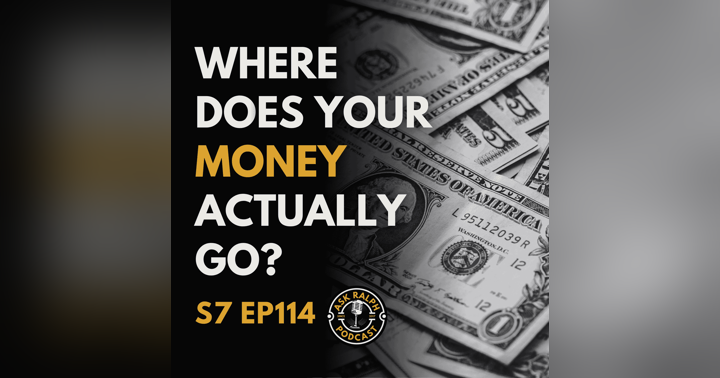How Do You Handle a 1099 Form? A Complete Guide

Ask Ralph: Help! I Just Got a 1099 - What Is It and What Do I Do Now?
Welcome back to “Ask Ralph,” your daily dose of Christian financial wisdom! Today, we tackle a question that pops up every tax season: "Help! I just got a 1099 - what is it, and what do I do now?" If you've recently received a 1099 form, How Do You Handle a 1099 Form? Don't worry, you're not alone! Let's break it down and explore how to navigate this tax document through a biblical lens.
Check out the full podcast episode:
Understanding the 1099 Form
In the simplest terms, a 1099 form is an IRS document that reports various types of income you may have earned outside of traditional employment. Unlike a W-2, which reports wages from an employer, a 1099 indicates income from sources like freelancing or independent contracting1. Essentially, if you've earned money from a source that doesn't consider you an employee, you'll likely receive a 10991. It's also possible to receive both a 1099 and a W-2 in the same year if you have both types of income1.
Different Types of 1099 Forms
While the term "1099" is used generally, there are actually several types of 1099 forms, each designed for a specific kind of income. Here's a table summarizing some common ones:
|
Form Name |
Description |
Example |
|
1099-NEC |
Non-Employee Compensation |
This is the most common type for freelancers and independent contractors. It reports payments for services rendered. |
|
1099-MISC |
Miscellaneous Income |
This form reports various types of income, such as rents, royalties, prizes, and awards. |
|
1099-DIV |
Dividends and Distributions |
This reports dividends and distributions from investments, such as stocks or mutual funds. |
|
1099-INT |
Interest Income |
This reports interest income earned from bank accounts or other interest-bearing investments. |
|
1099-K |
Third-Party Network Transactions |
This form reports payments received through third-party payment platforms like PayPal, Venmo, and credit card companies. |
A significant change in recent years is the reporting requirement for 1099-K forms. Previously, only payments over $20,000 and 200 transactions were reported. However, starting in 2023, the threshold was lowered to $600 in payments, regardless of the number of transactions2. This means many more people who receive payments through these platforms will now receive a 1099-K.
What to Do When You Receive a 1099
Receiving a 1099 means the IRS has been notified of your income, so it's crucial to report it accurately on your tax return. Here's a step-by-step guide:
- Identify the Type of 1099: Determine which type of 1099 you've received (e.g., 1099-NEC, 1099-MISC) to understand the specific income being reported.
- Gather Supporting Documentation: Collect any relevant records related to the income reported on the 1099, such as invoices, payment receipts, and expense records3. This is especially important for freelancers and independent contractors who can deduct eligible business expenses from their income.
- Understand Self-Employment Taxes: If you received a 1099-NEC, you'll likely need to pay self-employment taxes, which cover Social Security and Medicare4. The self-employment tax rate is 15.3% of your net earnings4.
- Consider Estimated Taxes: If you expect to owe $1,000 or more in taxes, you may need to make estimated tax payments throughout the year to avoid penalties5. Estimated taxes are payments made quarterly to cover taxes that aren't withheld from your income, such as those on 1099 income6. You can calculate your estimated taxes using Form 1040-ES or consult a tax professional for assistance7. Failing to pay estimated taxes can result in penalties, so it's important to plan ahead and make these payments on time6.
- Seek Professional Guidance: If you're unsure about any aspect of your 1099 or tax obligations, consult a qualified tax professional, especially if your financial situation is complex8.
Employee vs. Independent Contractor: A Key Distinction
It's important to understand the difference between being an employee (who receives a W-2) and an independent contractor (who receives a 1099). Employees have taxes withheld from their paychecks and may be eligible for benefits like health insurance and retirement plans7. Independent contractors, on the other hand, are responsible for managing and paying their own taxes, including self-employment tax7. They also need to handle their own benefits, such as health insurance and retirement savings5. This distinction has significant implications for your tax obligations and overall financial planning.
Seeking Wise Counsel: Christian Financial Advisors
Navigating the world of 1099s and self-employment taxes can be complex. Consider seeking guidance from a Christian financial advisor who can provide biblically-responsible advice tailored to your specific situation. The Christian Financial Advisors Network, for example, is a group of experts committed to the highest quality of advice, holding certifications like CERTIFIED FINANCIAL PLANNER™ and Certified Kingdom Advisor®9. They act as fiduciaries, meaning they are legally obligated to act in your best interest9.
Biblical Principles for Handling Your Finances
As Christian stewards, our financial decisions should reflect biblical principles. Here are a few verses to guide us:
- Proverbs 13:11: "Dishonest money dwindles away, but whoever gathers money little by little makes it grow." 10 This verse encourages us to be honest and diligent in our financial dealings, including paying our taxes faithfully. For example, if you receive a 1099 for income earned through freelancing, it's essential to accurately report that income and pay the appropriate taxes. This reflects integrity and responsible stewardship.
- Romans 13:8: "Owe no one anything, except to love each other, for the one who loves another has fulfilled the law." 11 This reminds us of our obligation to fulfill our financial responsibilities, including tax obligations, to the best of our ability. Just as we strive to be honest in our personal relationships, we should also be honest and upright in our financial dealings with the government.
- Matthew 25:14-30: The parable of the talents teaches us to be responsible stewards of what God has entrusted to us, including our finances. This involves wise planning, saving, and investing. If you receive a 1099, it's important to plan for the tax implications and set aside money throughout the year to cover your tax liability. This demonstrates wise stewardship and avoids potential financial difficulties during tax season.
- Proverbs 28:20: "A faithful man will abound with blessings, but whoever hastens to be rich will not go unpunished." This verse emphasizes the importance of honesty and integrity in our pursuit of wealth. Accurately reporting your 1099 income and paying your taxes is not only a legal obligation but also a reflection of your faithfulness to God's principles.
Conclusion
Receiving a 1099 may seem daunting at first, but it's simply a reminder of our responsibility to manage our finances with integrity and wisdom. A 1099 form reports income earned outside of traditional employment, and it's crucial to understand the different types of 1099s and your tax obligations related to them. When you receive a 1099, take the time to identify the form, gather your supporting documents, and understand your tax responsibilities, including self-employment taxes and estimated tax payments. If you find the process confusing or overwhelming, don't hesitate to seek guidance from a qualified tax professional, preferably one who shares your Christian values.
Remember, God calls us to be faithful stewards in all areas of our lives, including our finances. By approaching our tax obligations with honesty, diligence, and wisdom, we can honor God and experience His blessings in our financial journey.
Works cited
- What Is a 1099 Form? What Freelancers Need to Know - Keeper Tax, accessed January 12, 2025, https://www.keepertax.com/posts/what-is-a-1099-form
- Freelancing and Form 1099-NEC: Everything You Need to Know - 1800Accountant, accessed January 12, 2025, https://1800accountant.com/blog/freelancing-and-form-1099-nec-everything-you-need-to-know
- 1099 freelancer tax form explained: 7 must-know facts - Hello Bonsai, accessed January 12, 2025, https://www.hellobonsai.com/blog/1099-freelance
- Self-Employment Tax: Calculator, Rates - NerdWallet, accessed January 12, 2025, https://www.nerdwallet.com/article/taxes/self-employment-tax
- Understanding Estimated Tax Payments in 2025 | Bench Accounting, accessed January 12, 2025, https://www.bench.co/blog/tax-tips/estimated-tax-payments
- Estimated Tax Payments 2025: How They Work, Due Dates - NerdWallet, accessed January 12, 2025, https://www.nerdwallet.com/article/taxes/estimated-quarterly-taxes
- 1099 Tax Calculator | Estimate Your Self-Employment Taxes - Everlance, accessed January 12, 2025, https://www.everlance.com/tax-calculator
- Tax Preparation Services - Christian Financial Services LLC, accessed January 12, 2025, https://www.christianfinancials.org/tax.html
- Christian Financial Advisors Network, accessed January 12, 2025, https://www.christianfinancialadvisorsnetwork.com/
- 25 Bible Verses About Managing Your Finances - Pushpay, accessed January 12, 2025, https://pushpay.com/blog/25-bible-verses-about-managing-your-finances/
- 18 Bible Verses About Wealth and Prosperity - Kenneth Copeland Ministries, accessed January 12, 2025, https://www.kcm.org/real-help/finances/apply/18-bible-verses-about-wealth-and-prosperity?language_content_entity=en-US












